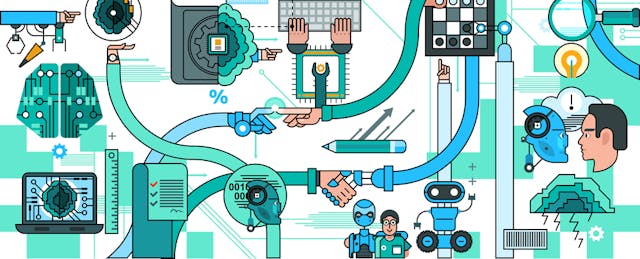Education technology has a public relations problem. In a space where words carry wide currency, our choice of language matters.
That’s why I’m troubled by Artificial Intelligence (AI). At a time when educators need assurances that digital innovations will work for them, the fundamental premise of this technology may imply just the opposite.
The term evokes the awkward connotation of machines displacing human capabilities. This discomfort has been capitalized upon—perhaps to an exaggerated extent—in movies like Terminator and 2001: Space Odyssey. But the fear creeped into public consciousness through a series of gaming feats. In 1997, IBM’s Deep Blue defeated the reigning world chess champion, Garry Kasparov. Recent cognitive triumphs in Jeopardy and Go have emphatically answered the question of whether machines can “think.”
With the rise of AI-driven intelligent tutors, educators have been forced to confront their own existential crisis: can a machine teach and, if so, where does this leave teachers?
As intelligent tutors inch towards more human-like behaviors, many educators are suspicious of what they perceive as AI’s looming threat. It is natural for teachers—or people, for that matter— to resist any technology that threatens their relevance in the world. The matter is hardly helped when companies claim they are capable of building mind-reading robo-tutors.
The dominant narrative of AI pits man against machine. But it’s time for the edtech community to dispense with this false dichotomy and instead embrace the alternative version of AI: Augmented Intelligence.
The premise of Augmented Intelligence is that technology exists to amplify human effort. This subtle shift in emphasis starts with an understanding of our human goals. Only then does technology enter the mix, occupying the tedious aspects of white-collar work and freeing up humans to work in smarter ways. For example, in the new field of Cognitive Healthcare, IBM’s Watson aids doctors by processing gigantic troves of information on their behalf. Doctors can then combine these insights with their own judgment to deliver richer diagnoses.
Can education, too, be uplifted by intelligent machines?
The human effort of educators lies in planning lessons, creating rich learning environments and, most importantly, building a deep connection with every student. With those goals in mind, intelligent tutors need to evolve in four ways:
Let teachers into the black box of tutoring algorithms. Intelligent tutors are driven by sophisticated algorithms that determine the sequence and scope of students’ passage through the curriculum. The understanding of these algorithms must not be the exclusive domain of machine-learning builders. The pedagogical and design principles underpinning intelligent tutors must be transparent to educators, who must be afforded the space to direct intelligent tutors towards their instructional goals.
Deliver actionable insights instead of data dashboards. Intelligent tutors capture real-time interactions, which are converted into data-rich reporting dashboards for teachers and administrators. Yet the usability of these dashboards is often relegated to an afterthought. Pretty visualizations are privileged ahead of actionable insights. Teachers cannot afford to spend their limited time navigating reporting dashboards; that time is better spent attending to students’ individual needs. They require actionable insights that enrich their lesson planning and are easy to implement.
Support deeper instruction. At their best, intelligent tutors present a highly effective and efficient method of grounding students along core knowledge and skills. But they rely on the ability to automatically grade students’ responses, which limits the depth of knowledge they can impart and assess. Even as these technologies mature, they will never cater for the full range of students’ cognitive and emotional needs. Thank goodness for human teachers. Intelligent tutors must become the great enabler of the deeper instructional experiences that only human educators can deliver.
Harvest the collective intelligence of teachers. The most powerful learning insights reside in the day-to-day interactions teachers have with their students. Too often, these insights are confined to a single classroom or school. As intelligent tutors blend into teachers’ learning environments, they must extract and disseminate lessons learned on what works (and what doesn’t). In this way, intelligent tutors can facilitate a community of shared practice among teachers—spreading professional insight through their network.
In the paradigm of Augmented Intelligence, intelligent tutors are better thought of as intelligent teaching assistants, striving to make the lives of educators easier. Today’s intelligent tutors are built to adapt to students’ individual learning needs. By blending into teachers’ learning environments and augmenting their practice, the intelligent teaching assistant of tomorrow will also adapt to the unique challenges and circumstances faced by educators.


